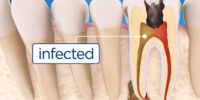Types of dental surgery

Dental surgery refers to any surgical procedure that is performed in or around the mouth, teeth, gums, or jaw. There are many different types of dental surgery, and the specific procedure will depend on the patient’s needs and the recommendation of their dental professional.
Common types of dental surgery:
- Dental extractions: Dental extractions, also known as tooth extractions, involve removing a tooth from the mouth. This may be necessary if the tooth is decayed, damaged, or infected beyond repair.
- Dental implants: Dental implants are a permanent solution for missing teeth. They involve placing a titanium post into the jawbone, which serves as a replacement for the tooth root. A crown, bridge, or denture is then attached to the implant to replace the missing tooth.
- Gum surgery: Gum surgery is performed to treat gum disease or to improve the appearance of the gums. This may involve removing infected tissue, reshaping the gums, or grafting tissue onto the gums to increase the amount of gum tissue.
- Root canal: A root canal is a procedure to remove infected or damaged tissue from inside the tooth. It is performed to save a tooth that is badly decayed or infected.
- Orthodontic surgery: Orthodontic surgery may be recommended for patients with severe misalignment of the teeth or jaw. This type of surgery involves moving the teeth or jaw into a more desirable position.
- Jaw surgery: Jaw surgery may be necessary to correct misalignment of the jaw or to treat a condition called temporomandibular joint disorder (TMJ).
Severe types of dental surgery
- Jaw surgery: Jaw surgery, also known as orthognathic surgery, is a type of procedure that involves repositioning the jaw to correct misalignment or to treat a condition called temporomandibular joint disorder (TMJ). This type of surgery is typically reserved for patients with severe misalignment of the jaw or severe TMJ symptoms that cannot be treated with less invasive methods.
- Dental implants: While dental implants are a common and generally safe procedure, they can be considered severe in certain cases. For example, patients who require multiple implants or who have a severely damaged jawbone may require more extensive surgery.
- Gum surgery: Gum surgery can range from simple procedures, such as removing infected tissue, to more complex procedures, such as gum grafting. Gum grafting involves taking tissue from another part of the mouth or using synthetic material to cover exposed roots or to add volume to the gums. This type of surgery may be necessary for patients with severe gum recession or for those who have experienced significant bone loss due to gum disease.
- Orthodontic surgery: Orthodontic surgery may be necessary for patients with severe misalignment of the teeth or jaw that cannot be corrected with traditional orthodontic treatment, such as braces. This type of surgery involves moving the teeth or jaw into a more desirable position.
It is important to note that any type of surgery carries some level of risk and it is important to discuss the risks and benefits with your dental professional before undergoing any procedure.
Who can perform dental surgery
Dental surgery is typically performed by a dental specialist, such as an oral surgeon or periodontist. Oral surgeons are dentists who have completed additional training in surgical procedures involving the mouth, teeth, gums, and jaw. Periodontists are dental professionals who specialize in the prevention, diagnosis, and treatment of gum disease.
In some cases, a general dentist may be able to perform certain types of dental surgery, such as tooth extractions or root canals. However, more complex procedures, such as dental implants or jaw surgery, are typically referred to a specialist.
It is important to note that dental surgery should only be performed by a licensed dental professional. Do not seek dental surgery from an unlicensed or untrained individual.
If you are considering dental surgery, it is important to discuss the risks and benefits with your dental professional. They can help you determine the best course of action for your individual needs.









